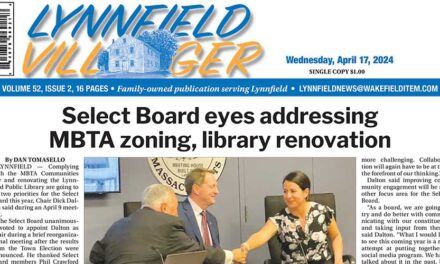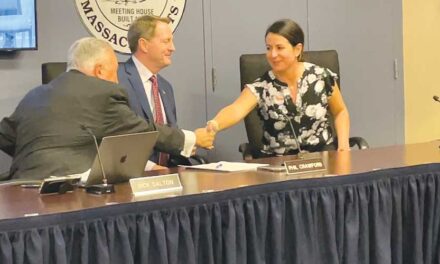Published June 26, 2019
By DAN TOMASELLO
LYNNFIELD — The town is in good financial shape, Melanson Heath Audit Manager Zackary Fentross told the Board of Selectmen recently.
Fentross noted the audit focused on fiscal year 2018, which ended last June. State law requires municipalities to publish a record of financial statements at the end of each fiscal year.
The report stated that the town has been “focused on addressing the numerous needs of the community.”
“The town of Lynnfield has attained a solid financial rating of AA+ from Standard and Poor’s since 2014,” the report stated. “This reflects Lynnfield’s strong budgetary flexibility, very strong liquidity with very little capital needs. The town of Lynnfield has a very conservative approach to budgeting. The town maintains a 10-year capital improvement plan and prepares a formal three-year budget forecast.”
Fentross noted that the town spent about $481,000 on various vehicle purchases in FY18 along with $1.2 million on road improvements and $359,000 on school technology. He said the town’s net pension liability had a $30,083,690 balance.
“That is about a $565,000 decrease from the prior year,” said Fentross. “This represents the town of Lynnfield’s portion of the Essex Regional Retirement System’s total unfunded liability. Lynnfield makes up about 8 percent of that regional retirement system. That retirement system is about 55.4 percent funded, which is low in the commonwealth. The average that we see for a retirement system in the commonwealth is about 70 to 75 percent. The retirement system that the town of Lynnfield is in is on the lower side of funding.”
Fentross attributed the $565,000 decrease to two different factors.
“The first is that the retirement system saw strong investment returns in 2017,” said Fentross. “The retirement system actually earned about $33 million more than they had anticipated and what they had expected. That led to a $2.6 million benefit to the town of Lynnfield. So that liability decreased by about 2.6 percent, but it was offset by a change in assumption. The retirement system changed their discount rate from 7.75 percent to 7.5 percent, which increased that liability. The net effect of positive operating results combined with the change in assumption led to a total decrease of about $565,000.”
Fentross said the town’s Other Post Employment Benefits (OPEB) liability totals $75,023,267.
“It’s about a $38 million increase from the prior year,” said Fentross. “That is due to the implementation of the Governmental Accounting Standards Number 75. The town of Lynnfield had to do this along with every municipality in the United States. On the bright side, the town has begun to fund that liability. The town does have an Other Post Employment Benefits trust fund, which is about 1.2 percent funded. I know that 1.2 percent is very low, but the town is not alone in that. Most municipalities in the commonwealth are anywhere between 0 percent and 10 percent. The town of Lynnfield is right in that line.”
Fentross said bond rating agencies want to see municipalities fund OPBED liabilities.
“The town of Lynnfield has made that commitment and is putting money aside in that trust fund on an annual basis,” said Fentross. “That will be viewed favorably by bond rating agencies.”
Fentross said the town’s General Fund had $949,561 in property taxes collected in FY18.
“The town does a very good job collecting taxes or collecting tax liens in a timely manner,” said Fentross. “That is a strong position for the town to be in.”
Fentross said the General Fund’s unassigned balance totaled $4,672,751.
“That is about a $1 million decrease from the prior year,” said Fentross. “This is one of the most important figures in the town’s financial statements. What the bond rating agencies want to see in AAA communities is that figure be between 10 to 15 percent of the budgeted expenditures. That ratio is about 8.13 percent. I want to specify that 8 percent is not a bad position to be in, but if the town’s ultimate goal is to be a AAA community, the town wants to work toward increasing that unassigned fund balance.”
Fentross attributed the decrease in the unassigned fund balance to “the town using Free Cash but not being able to replenish it in full.”
“On the bright side, what the bonding rating agencies like to see is using Free Cash for one-time capital items,” said Fentross. “And that $2.3 million was used for one-time capital items in 2018. The bonding rating agencies will view that use of fund balance favorably.”
In closing, Fentross said, “The town is in a good financial position.” He noted Melanson Heath did not send the town a management letter.
“We look at the town’s internal controls to make sure the town’s assets are safe guarded,” said Fentross. “If we saw any area where improvements could be made, we would recommend that in a management letter. But there is no management letter in 2018, which means we did not have any recommendations. Out of Melanson Heath’s clients in the commonwealth, which are many, 10 to 15 percent don’t receive a management letter. The town of Lynnfield is in high regard by not receiving a management letter.”
Selectmen Chairman Phil Crawford and Selectman Dick Dalton both thanked Town Accountant Julie McCarthy, Town Administrator Rob Dolan and Assistant Town Administrator Bob Curtin for working diligently to help compile the report.
“It’s great that the town did not receive a management letter,” said Dalton.




